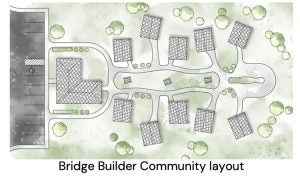When she was five years old, Sarah Michalke entered the foster care system. Her father had been arrested, and her mother decided she was unable to care for their six children.
“He got locked away, and our mom basically decided that because of her addiction and things, she could not afford to take care of me, my three brothers and my big sister, so she put us up for adoption,” said Michalke, who is stationed at Fort Gordon.

Sarah Michalke
Her younger sister was quickly adopted, but the other kids, who’d been basically raising themselves, went to different foster homes in North Carolina, she said.
“They had to split us up, and I kind of bounced around from home to home for a while,” Michalke said.
Michalke, now a Navy linguist, was nonverbal at the time, making her less likely to be adopted. “A lot of people were not willing to take on that responsibility,” she said.
A half-dozen homes later, Michalke found herself a pregnant high school senior, petrified as she had to exit the foster care system. It had kept her fed and clothed for 12 years but left her traumatized and unprepared for life in the real world.
“I was more scared than anything. I knew I wasn’t prepared,” she said. “There were a lot of the nonphysical needs that weren’t met. Mental health, the soft skills that someone would get from their parents.”
By way of a boyfriend, Michalke first found support at a Douglasville, Ga., church, but when the relationship ended, she walked into the Navy recruiting office. A cousin cared for her child while Michalke completed basic training. They reunited in California where the Navy sent Michalke for foreign language training.
MORE: Stay Social Tap & Table to permanently close at end of year
Aging-out: Veteran determined to solve problems
Augusta native Jackson Drumgoole II retired in April after 29 years in the Army. As a highly-trained strategic force manager, he moved in front of the forces to construct operations such as Cyber Command.
While he grew up in a stable home, Drumgoole recalls some of his cousins having to live in foster care.

“I’m 13-14 years old and I’m like, ‘This is not right. Why do I have a mother and father in the house and have some stability and consistency, and they don’t?'” Today, “they’re 49-50 years old and still have not recovered,” he said.
Drumgoole, who was honored alongside President Bill Clinton as the 2013 National Father’s Day Committee and GQ Magazine “All-Star Dad,” said the lack of a stable home caused his cousins’ troubles.
“The root of the problem was there wasn’t a stable community for my family members to go to and say, ‘This is where I can unpack my bags. I have refrigerator rights in this house. This is where I know I can come sit at the dining room table and get counseled to help me flourish as an adult,” he said.
Drumgoole said the statistics are troubling for foster kids, and worse for them in Augusta, where approximately 483 are currently in foster care.
Nationwide, up to 46% of kids who age out of foster care have been homeless by the time they are 26 years old. Sixty percent of child sex trafficking victims were child welfare cases. In Augusta, that number rises to 75%, Drumgoole said.
Group homes, where many older foster children are placed, are part of the problem. There, girls are recruited into sex trafficking, often by their peers in the home, he said.
That’s part of why group homes are not the answer for kids aging out of foster care – the 18-25 population wants independencenbut also a stable, safe place, he said.
Tiny home village would be Augusta’s first
Earlier this year, the Augusta Commission passed the city’s first tiny home ordinance, which allows them only in groups that are set apart from other neighborhoods. So far, Drumgoole Family Initiatives is the first to propose such a community.
Drumgoole’s plan is to construct an initial village of 10 single-story tiny homes called the Bridge Builder Community. It’s modeled on the PIVOT tiny home neighborhood in Oklahoma City, where kids get to chose from a few different configurations.
Individual units with approximately 320 square feet seems the best fit, with an estimated price of $60,000-$90,000 per unit, he said.
“A psychological component to kids living in tiny homes is the safety,” he said. “Some kids only want one entrance. Some kids want two doors. And they need breakaway appliances.”

That means no ceiling fans, suspended railings or other ways a young person might kill themselves, he said.
The young adults won’t be left to their own devices. The community will have a 3,200 square-foot community center, around-the-clock security and provide wraparound services, he said. Residents are screened for trauma, often from sexual abuse and other problems. Alcohol won’t be allowed, he said.
“Building houses and getting homes is easy,” he said. “The issue is the wraparound skills — life skills, workforce skills, life coaching, teaching all those critical life skills.”
The community will use a three-tiered program over the maximum of three years a resident may live there. As their supervision levels decrease, residents have to to meet certain milestones, such as maintaining a job, preparing healthy meals and paying the rent. From there, residents move on to filing their taxes, maintaining checking accounts and putting money into savings.
Drumgoole said he met with city Planning and Development to ensure the proposal complies with Augusta’s tiny home ordinance and said community perceptions of tiny home communities as dangerous and a drain on property values do not apply, he said.
“We’re doing a tiny-home community. We’re not putting a tiny home in a front yard; we’re not building a homeless shelter or a juvenile delinquency neighborhood. Ongoing perceptions don’t define what we’re doing at all,” he said.
The gated community will have a single entrance accessible only by residents and service providers, he said.
“I have the FBI sex-trafficking task force; I have I-Care there on our team as well. We want to make certain that area is secured, hopefully like Fort Knox,” Drumgoole said.
MORE: Augusta’s three new commissioners are ready to get started
What comes next
Drumgoole said his organization is looking at sites in urban areas of Richmond County but hasn’t selected one. In the first half of 2023 he hopes to secure a location and launch a capital campaign.
“We’ll be layering finances, so going through federal grants and going through our community campaign plan, certain families in the area that we’ll tap into; industry that we’ll tap into to make sure that we continue to lock in our community stakeholders and sign those memorandums of understanding,” he said.
“And then prayerfully, we’ll start building and taking applications in the third quarter of 2023.”
The Bridge Builder Community board includes architect Joe Gambill, Augusta Technical College President Jermaine Whirl, banker Penny Wasden and Augusta Partnership for Children Deputy Director Vikki Pruitt
Drumgoole said his career left him capable of supporting himself and his entire family. While many get in the foster care industry for the money, he did not. “I could care less if no one paid me a dime,” he said.
Drumgoole has met with city officials that facilitate federal grants, such as Augusta Housing and Community Development. A fundraising target is $2 million by October 2023, according to Drumgoole’s recent presentation to Augusta’s homelessness task force.
Michalke met Drumgoole by chance in Augusta. She and another sailor now volunteer with the organization, and they’d like to get more service members involved in the effort, she said.
One thing that’s different about the community is it seeks guidance from the younger community it wants to serve and has a youth advisory panel, Michalke said.
“We’ve sat down for hours talking about what do we want to do, and actually asking them, what do you want, what do you need?” she said.
Michalke said the proposal resonated deeply with the experiences she’d had in the foster care system.
“The moment he told me about the Bridge Builder Community, the moment those words came out of his mouth I thought if I can prevent even one person from feeling like that, I’m going to do it,” she said.
Susan McCord is a staff writer with The Augusta Press. Reach her at susan@theaugustapress.com













